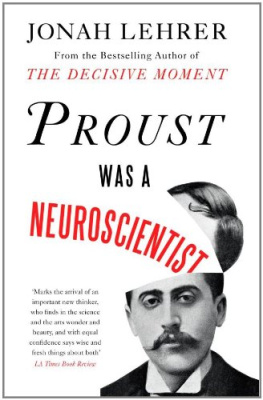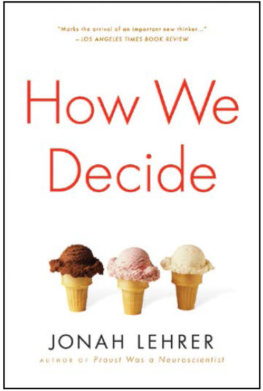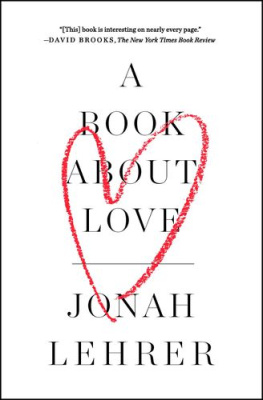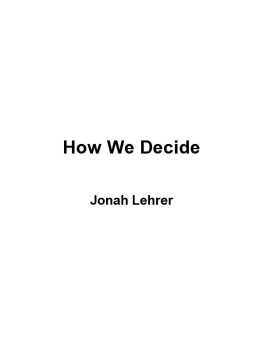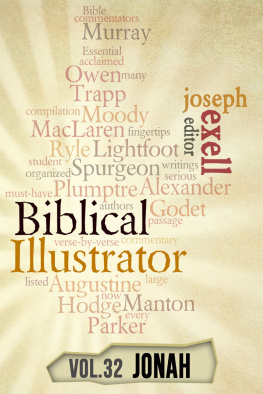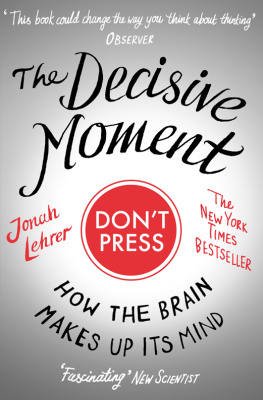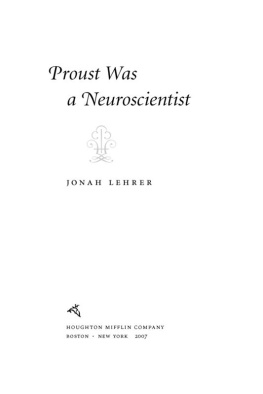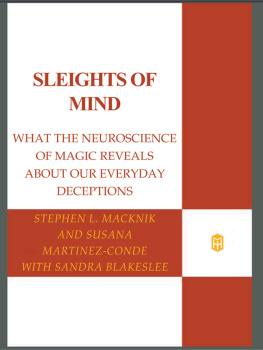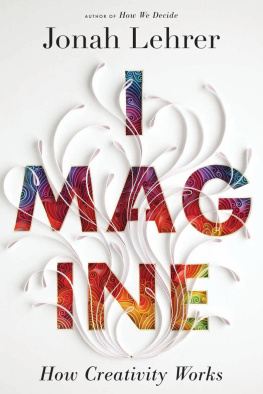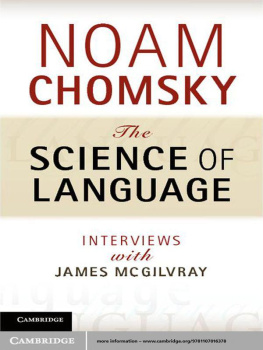Acknowledgments
W HERE TO BEGIN ? I guess at this book's beginning. My agent, Emma Parry, got in contact with me after reading a short article of mine inSeedmagazine. Her patience and guidance were extraordinary. It took many incoherent drafts, but she eventually helped me shape my disorganized thoughts about Proust and neuroscience into a coherent book proposal.
I did most of my research at Oxford University. For giving me the luxury of spending all day in a library, I thank the Rhodes Trust.
I first had the idea for this book while working in the neuroscience lab of Dr. Eric Kandel. When I began working in Dr. Kandel's lab, I dreamed of being a scientist. After spending a few years with his postdocs and grad students, I quickly realized that I wasn't good enough. (W. H. Auden once said that when he found himself in the company of scientists he felt like "a shabby curate who has strayed by mistake into a room full of dukes." I understand the feeling entirely.) I will always be grateful to Dr. Kandel for giving me the chance to participate in the scientific process. In addition, I want to thank all the scientists who talked with me while I wrote this book. I'm convinced that postdocs are the suffering artists of the twenty-first century.
In Dr. Kandel's lab, I worked for Dr. Kausik Si. I could not have asked for a better mentor. His brilliance and kindness will always inspire me. Although I probably set his research back a few yearsI excelled at experimental failureour conversations about literature and science were essential to my thinking.
And then there are those patient souls who read my rough drafts and told me how to make them better. This book would be incomparably worse were it not for Jad Abumrad, Steven Pulimood, Paul Tullis, Sari Lehrer, and Robert Krulwich. I would also like to thank everyone at Houghton Mifflin, especially Will Vincent, who ably led me through the logistics of creating a book, and Tracy Roe, who did a fantastic job of finding and fixing errors in the manuscript.
Amanda Cook is a truly amazing editor. I really can't say enough good things about her. If it were not for her comments, this book would be twice as long and half as readable. She not only fixed my prose, she fixed my ideas. Amanda also trusted me to write about a very big subject, and for that I will always be grateful.
Finally, I owe an impossible debt to my girlfriend, Sarah Liebowitz, and my mother, Ariella Lehrer. They both have read this book way too many times to count. When I was upset with my writing, they cheered me up. And when I forgot how much work remained, they reminded me. Every sentence is better because of their support, criticism, and love. Without whom not.
Notes
1. Walt Whitman: The Substance of Feeling
"Was somebody asking": Walt Whitman, Leaves of Grass: The "Death-Bed"
Edition (New York: Random House, 1993), 27.
"a person": Ibid., 702.
"Your very flesh": As cited in Paul Berman, "Walt Whitman's Ghost," The
New Yorker (June 12, 1995): 98104.
"The mind is embodied": Antonio Damasio, Descartes' Error (London: Quill, 1995), 118.
"You might as easily": Brian Burrell, Postcards from the Brain Museum (New York: Broadway Books, 2004), 211.
"the greatest conglomeration": Jerome Loving, Walt Whitman (Berkeley: University of California Press, 1999), 104.
"its totality": Horace Traubel, Intimate with Walt: Selections from Whitman's
Conversations with Horace Traubel, 18821892 (Des Moines: University of Iowa Press, 2001).
"I was simmering": Loving, Walt Whitman, 168.
"I like the silent": Ralph Waldo Emerson, Nature, Addresses, and Lectures
(Boston: Houghton Mifflin, 1890), 272.
"broad shouldered": Loving, Walt Whitman, 224.
"Leading traits of character": Ibid., 150.
"one of the richest": Donald D. Kummings and J. R. LeMaster, eds., Walt
Whitman: An Encyclopedia (New York: Garland, 1998), 206.
"The poet stands among": Emerson, Nature, 455.
"Doubt not": Ralph Waldo Emerson, Selected Essays, Lectures, and Poems
(New York: Bantam, 1990), 223.
"I am the poet": Ed Folsom and Kenneth M. Price, "Biography," Walt Whitman
Archive, http://www.whitmanarchive.org/biography (accessed January 7, 2005).
"I am not blind": Loving, Walt Whitman, 189.
10 "in danger": Ibid., 241.
"What does a man": Ibid.
"the human body": Whitman, Leaves of Grass: The "Death-Bed" Edition,
699.
"O my body": Ibid., 128.
"where their priceless blood": Ibid., 387.
"pieces of barrel-staves": Loving, Walt Whitman, 1.
"the heap of feet": Edwin Haviland Miller, ed., Walt Whitman: The Correspondence.
(New York: New York University Press, 19611977), 59.
"Those three": Ibid., 77.
"opened a new world": Loving, Walt Whitman, 1.
"From the stump": Whitman, Leaves of Grass: The "Death-Bed" Edition, 388.
"the hiss of the surgeon's knife": Ibid., 91.
"a sense of the existence": Silas Weir Mitchell, Injuries of Nerves, and Their
Consequences (Philadelphia: Lippincott, 1872).
"invisibly and uninterpenetratingly": Herman Melville, Redburn, White-Jacket, Moby Dick (New York: Library of America, 1983), 129498.
"to his horror": Laura Otis, ed., Literature and Science in the Nineteenth Century
(Oxford: Oxford University Press, 2002), 35863.
"How much of the limb": William James, "The Consciousness of Lost Limbs,"
Proceedings of the American Society for Psychical Research 1 (1887).
"passionate and mystical": William James, Writings: 18781899 (New York: Library of America, 1987), 851.
"contemporary prophet" : Bruce Wilshire, ed., William James: The Essential
Writings (Albany: State University of New York, 1984), 333.
"the kind of fiber": Ibid., 337.
"It is a sort of work": Louis Menand, The Metaphysical Club (New York: Farrar, Straus and Giroux, 2001), 324.
"The demand for atoms": James, Writings: 18781899, 996.
"I will not make poems": Whitman, Leaves of Grass: The "Death-Bed" Edition,
26.
"there would be nothing": William James, "What Is an Emotion?" Mind 9
(1884): 188205.
"The body contributes": Antonio Damasio, Descartes' Error (London: Quill, 1995), 226.
One of Damasio's most surprising discoveries: Ibid., 21217.
"There is more reason": Friedrich Nietzsche, The Portable Nietzsche (Viking: New York, 1977), 146.
"the curious sympathy": Whitman, Leaves of Grass: The "Death-Bed" Edition,
130.
"the spirit receives": Walt Whitman, Leaves of Grass (Oxford: Oxford University Press, 1998), 456.
"I will make the poems": Ibid., 20.
"Hurray for positive science": Whitman, Leaves of Grass: The "Death-Bed" Edition, 64.
"for they are vascular": Ralph Waldo Emerson, Selected Essays, Lectures, and Poems (New York: Bantam, 1990), 291.
23 "I and this mystery": Whitman, Leaves of Grass: The "Death-Bed" Edition, 36.
"When you organize": Randall Jarrell, No Other Book (New York: Harper-Collins, 1999), 118.
"Now I see it is true": Whitman, Leaves of Grass: The "Death-Bed" Edition,

